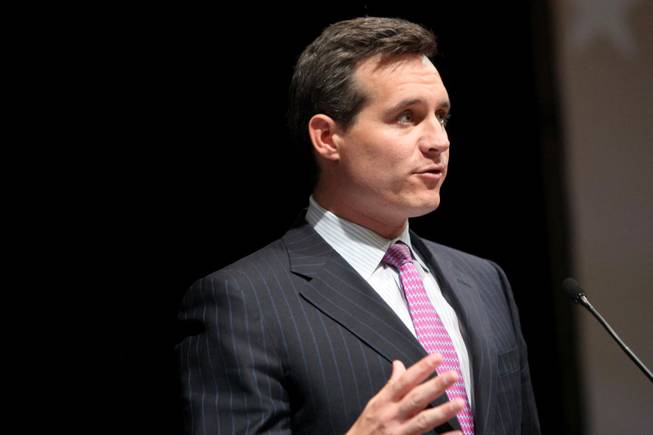
Secretary of State Ross Miller addresses the Nevada State Democratic Party Convention on June 26, 2010, at the Flamingo.
Tuesday, Jan. 24, 2012 | 2 a.m.
The imaginary Jane Smith, selling canned beans from her house and earning less than $27,000 a year, is exempt from the state’s $200-a-year business license fee.
But what about Jane Smith Canned Beans, LLC, making the same amount and also selling them from her home? Does that company have to buy a license?
From 2003 to 2009, such companies were required to shell out money to the state to do business. But in 2009, that changed, costing the state $10 million a year in tax revenue.
It’s a shift in state policy that Secretary of State Ross Miller takes responsibility for and said should never have happened. Miller has been on a yearlong quest to require thousands of home-based businesses on file as limited liability companies and corporations to again pay the business license fee.
His effort failed at the 2011 Legislature and at a legislative subcommittee meeting in December. Another legislative committee meeting in February could approve Miller’s proposed regulations, but he doesn’t think he has the votes. He is now pursuing his case in court.
The effort, which in the words of Miller will “close a loophole,” has drawn fire from Republican lawmakers and a trade group that registers companies. Expanding who pays the fee amounts to a tax increase on fledgling businesses, these opponents say.
The proposal, said Matthew Taylor, president of the Nevada Registered Agents Association, “does nothing but affect our state’s smallest enterprises.”
“The failure rate on home-based businesses are high enough without placing additional burdens on them,” he said.
The state never had the right to treat “natural persons” — human beings — differently than corporations and LLCs, he said, adding that Miller lost the policy argument in 2011, when his bill didn’t pass the Legislature.
“His office has no authority to ignore the outcome of his attempts to change the statute,” Taylor said.
Miller’s frustration at his inability to change the law is apparent. He said it reflects a larger unwillingness on the part of state lawmakers to tackle tough issues.
“All these questions that are raised about whether we have the political will to reform an unstable revenue structure in this state, this issue provides a perfect case study that the members of the Legislature don’t have the will to do it,” he said. “This is an opportunity to bring approximately $20 million over the biennium to the table by closing a loophole that didn’t exist until 2009. Many major business interests, including Las Vegas Chamber of Commerce, supported it. And they still haven’t done anything with it.”
In 2003, with the state looking for money, lawmakers passed the $100-a-year business license fee. It was administered under the Department of Taxation. But the department was so understaffed that, it was widely believed, it only collected a fraction of the tax it should have. So in 2009, with the state again looking for money, lawmakers proposed increasing the business license fee to $200. Collection of those fees would be put under the Secretary of State’s office, which already collected information on companies.
Soon after taking over those responsibilities, the Secretary of State’s office interpreted the statutes to say that home-based LLCs and corporations making less than $27,000 a year were deemed exempt from paying the fee. When revenue failed to come in at projections, the office investigated and found almost 100,000 businesses — including a bowling alley and nail salon — had claimed the exemption, which at the time only required a check to an online form.
Miller said his office was stunned at the number of businesses that sought the exemption. Many were fraudulently filed, audits found.
Miller noted that national law enforcement agencies and legislation are criticizing states like Nevada that have lax incorporation rules for allowing “shell companies” that might have ties to money laundering and tax evasion.
In August, Miller stopped accepting home-based business license exemptions online. Now, operators must fill out paper forms and have them notarized.
Taylor and his group are suing over the new regulations and some of the questions that Miller is asking. If people are falsely filing claims, the state should go after them for perjury, he said.
“If the secretary of state believes that fraud has occurred, we believe he should pursue the individual,” Taylor said.
No study has been done to show the depth of the fraud, he said.
The Nevada Registered Agents Association has sued Miller’s office because it now asks for information like the company’s revenue and officers’ salaries, which are beyond the scope of its duties, Taylor said.
Miller said if it succeeds, the lawsuit would prevent his office from doing due diligence, claiming the registered agents want to go to an “honor system” on paying the state business tax.
Miller filed a counter claim, arguing that his office, in 2009, remade policy that had existed since 2003. In it, Miller asks the court to force LLCs and companies to pay the $200 business license fee.
If the registered agents are successful, Miller said his office wouldn’t be able to verify anyone’s information.
“We’ll be holding up a banner in front of the Carson Capitol that says, ‘If you pay the state business license fee, you’re an absolute idiot.’ We wouldn’t be able to verify anything even if you lied,” he said.

Join the Discussion:
Check this out for a full explanation of our conversion to the LiveFyre commenting system and instructions on how to sign up for an account.
Full comments policy